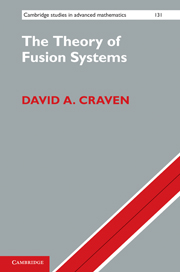9 - Exotic fusion systems
Published online by Cambridge University Press: 05 August 2012
Summary
If all saturated fusion systems were group fusion systems, then perhaps the field of fusion systems would merely be a useful way of describing fusion in finite groups, and maybe extending such theorems to blocks of finite groups. However, exotic fusion systems offer the possibility of new structures that are yet to be discovered.
One of the more intriguing facets in the theory at the moment is that, while there are many families of exotic fusion systems for odd primes, there is only one known family of simple exotic fusion systems for the prime 2. By Proposition 5.12 and the fact that soluble fusion systems are constrained, an exotic fusion system must contain a simple subquotient, and the exotic fusion systems that we know are ‘close to’ simple.
Related to this is the question of whether a fusion system of a block is a fusion system of a group. Conjecture 2.37 is the conjecture commonly believed to hold, that is, that every fusion system of a block of a finite group is the fusion system of some (possibly other) finite group. The obvious way to tackle this conjecture is a two-step process, as with many conjectures in group theory: firstly we reduce to simple groups (or groups close to simple, such as quasisimple); and secondly we prove the conjecture using the classification of the finite simple groups. Neither of these steps has been completed in this case, although we have some results in this direction.
- Type
- Chapter
- Information
- The Theory of Fusion SystemsAn Algebraic Approach, pp. 317 - 357Publisher: Cambridge University PressPrint publication year: 2011



